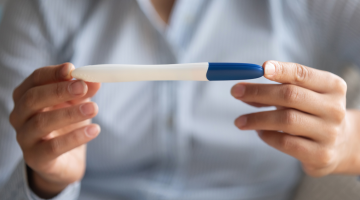How to Get Pregnant with Irregular Periods

If you’re wondering how to get pregnant with irregular periods, you’re not alone. While irregular cycles can make conceiving more challenging, it’s absolutely possible. Understanding what causes irregular periods and how to track ovulation can dramatically improve your chances of pregnancy, naturally or with fertility treatment.
When Are Menstrual Cycles Considered Irregular?
An average menstrual cycle lasts approximately 28 days, although cycles ranging from 24 to 38 days are still considered normal.
Your periods are considered irregular if:
Cycles are shorter than 24 days or longer than 38 days
Cycle length varies by more than 9 days month to month
You experience bleeding or spotting between periods
What Causes Irregular Periods When Trying to Get Pregnant?
Irregular cycles can have many causes, including hormonal imbalances, weight fluctuations, stress, medications, and conditions such as PCOS or perimenopause.
Hormonal Imbalances
Disruptions in luteinizing hormone (LH), follicle-stimulating hormone (FSH), estrogen, or progesterone can all lead to cycle irregularity.
In some cases, simple lifestyle changes can be used to correct hormonal imbalances, and in other, more extreme cases, medications can be used as hormone therapy.
Weight and BMI
A high or low BMI can affect hormones that regulate ovulation. Obesity is linked to higher rates of menstrual irregularity, anovulation, and infertility.
Being underweight can also lead to period irregularity, menstrual disruptions, and fertility problems.
Over-Exercising
High-intensity exercise can suppress ovulation. Moderate, non-vigorous exercise (30–60 minutes daily) supports ovulation.
Polycystic Ovary Syndrome (PCOS)
PCOS is one of the most common causes of anovulatory infertility.
Irregular periods and/or anovulation are common symptoms of PCOS. Getting pregnant with PCOS can be more difficult for some women, but not all women with PCOS experience infertility. A fertility consultation specific to PCOS will help you determine the appropriate treatment.
Age and Perimenopause
Perimenopause causes hormone fluctuations that lead to irregular periods and decreased egg quality. Even then, pregnancy is still possible, though less likely.
Perimenopause usually begins around age 47 and typically lasts 4-5 years. The official start of menopause is when a woman does not experience a period for 12 months.
Common symptoms of perimenopause include:
- hot flashes
- night sweats
- mood changes
- changes in cholesterol
- irregular periods
Women can still get pregnant during perimenopause, but they produce fewer eggs that are also of lesser quality.
Medications and Pregnancy
Certain medications (thyroid drugs, blood thinners, antidepressants, and chemotherapy) can alter menstrual cycles. If your period stops suddenly, consider testing for pregnancy with irregular periods to rule out a natural conception.
How to Get Pregnant with Irregular Periods Naturally
While irregular cycles make timing ovulation more complicated, pregnancy is still possible. The key is identifying your fertile window and optimizing ovulation.
How to Track Ovulation with Irregular Periods
Ovulation can be tracked through:
Ultrasound and bloodwork monitoring – Tracks follicle development and hormone changes.
At-home ovulation predictor kits (OPKs) – Detect LH surges that precede ovulation by 12–36 hours.
Since sperm can survive up to five days, having sex every other day starting with your LH rise maximizes the chance of fertilization.
Improve Ovulation Naturally
Light Exercise
Gentle activities like yoga, stretching, and walking improve blood flow and hormonal balance.
Reduce Stress
Stress can disrupt menstrual cycles. Mind-body practices such as yoga, meditation, and breathwork are shown to reduce stress.
Quit Smoking
Smoking disrupts menstrual regularity and ovulation. Quitting a year before conception can significantly improve fertility.
Fertility Diet
Dr. Robert Kiltz recommends a high-fat, low-carbohydrate “B.E.B.B.I.” diet (Bacon, Eggs, Butter, Beef, and Ice Cream). Research supports that low-carb, high-fat diets can regulate cycles and improve ovulation.
Fertility Supplements
Vitamins and nutrients, such as inositol, CoQ10, folate, vitamin D, and omega-3 fatty acids, support ovulation and regular menstrual cycles.
When to See a Fertility Specialist
If you’ve been trying to conceive for over a year (or six months if over 35), or your cycles are highly irregular, schedule a fertility evaluation. Blood tests can check for ovulation and underlying issues.
Fertility Treatments for Irregular Periods
Medicated Timed Intercourse
Uses ovulation-inducing medications like Clomid or Letrozole to regulate ovulation and time intercourse more precisely.
Intrauterine Insemination (IUI)
In a medicated IUI, ovulation is tracked via ultrasound, and prepared sperm are placed directly into the uterus at ovulation—helpful for male factor infertility or mild ovulatory disorders.
In-Vitro Fertilization (IVF)
IVF bypasses ovulation entirely by retrieving eggs, fertilizing them in the lab, and transferring embryos into the uterus. IVF offers the highest success rates and is ideal for severe ovulatory issues, tubal blockages, or advanced maternal age.
Learn more on our IVF Cost page.
Can You Still Get Pregnant with Irregular Periods?
Yes, you can still get pregnant with irregular periods. The key is determining whether ovulation occurs and addressing underlying causes. With lifestyle changes, supplements, or fertility treatment, many people conceive successfully.
The Takeaway
If you’re asking “is it harder to get pregnant with an irregular period?”—the answer is that while timing can be more difficult, conception is still highly achievable.
With proper guidance, lifestyle support, and, if needed, fertility treatment, most women with irregular periods are able to get pregnant and build the families they dream of.
Frequently Asked Questions About Getting Pregnant with Irregular Periods
Can you still get pregnant with an irregular period?
Yes. Many people conceive with irregular cycles, though it can take more time. The main challenge is predicting ovulation. Tracking ovulation through monitoring and testing or using ovulation predictor kits can help you time intercourse during your fertile window more effectively.
Is it harder to get pregnant with an irregular period?
It can be. Women with irregular periods often ovulate less consistently, which reduces the number of fertile days per year. However, once ovulation is confirmed—whether naturally or with ovulation induction medications—your chances of pregnancy are similar to those with regular cycles.
How can I track ovulation with irregular periods?
If your cycles are unpredictable, tracking ovulation with an ovulation predictor kit (OPK), basal body temperature charting, or hormone and ultrasound monitoring can help identify your fertile window. Learn more about how to track ovulation with professional support or at home.
How do I test for pregnancy with irregular periods?
When your period is irregular, wait at least 36 days after your last period or 14 days after possible ovulation to take a pregnancy test. This helps prevent false negatives. If your results are unclear or you suspect pregnancy despite a negative test, ask your provider for a blood test to confirm.
Can I still get pregnant naturally if my periods are irregular?
Absolutely. Many people with irregular periods conceive without medical intervention by improving lifestyle factors like diet, stress, and exercise. If conception doesn’t occur after several months of trying—or if you’re over 35—it’s best to schedule a fertility consultation to explore personalized options.



